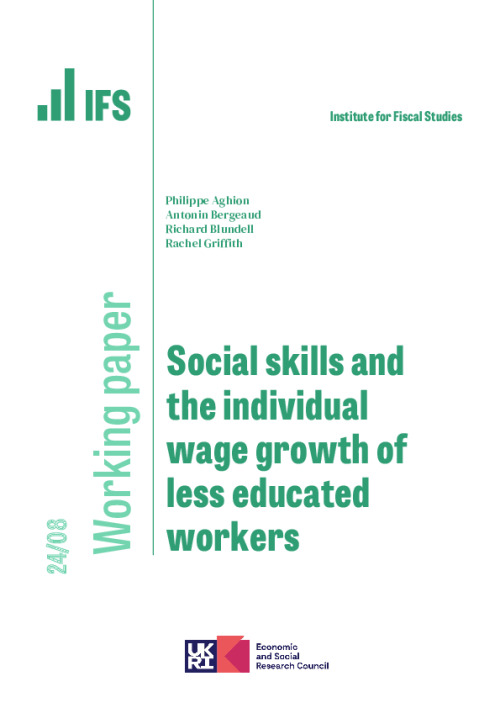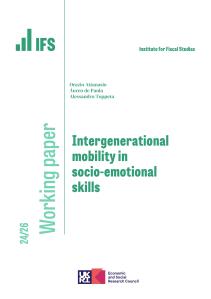Downloads

Download working paper PDF
PDF | 896.55 KB
Matched employee-employer data from the UK are used to investigate the importance of social skills, in particular team-work and communication with coworkers, as a driver of wage growth for workers with lower formal education. We find that in social skills tasks, workers enjoy greater wage progression with tenure and also accrue higher returns in firms with a higher concentration of more educated colleagues. Additionally, workers exit sooner from jobs where social skill are more important. We rationalize these dynamics through a model that assesses social skills based on complementarity with a firm’s assets, where social skills, initially opaque to both the employee and employer, become increasingly apparent over time.
Authors

Research Fellow London School of Economics
Philippe is an IFS Research Fellow, a Professor of Economics at LSE, at the College de France and at INSEAD, and a Fellow at the Econometric Society.

CPP Co-Director
Richard is Co-Director of the Centre for the Microeconomic Analysis of Public Policy (CPP) and Senior Research Fellow at IFS.

CPP Co-Director, IFS Research Director
Rachel is Research Director and Professor at the University of Manchester. She was made a Dame for services to economic policy and education in 2021.
Associate Professor HEC Paris
Working Paper details
- DOI
- 10.1920/wp.ifs.2024.0824
- Publisher
- Institute for Fiscal Studies
Suggested citation
Aghion, P et al. (2024). Social skills and the individual wage growth of less educated workers. 24/08. London: Institute for Fiscal Studies. Available at: https://ifs.org.uk/publications/social-skills-and-individual-wage-growth-less-educated-workers-0 (accessed: 30 June 2024).
More from IFS
Understand this issue

What does the Conservative's higher education announcement this week mean for apprenticeships and 'low-value' university courses?
1 June 2024

Why inheritance tax should be reformed
18 January 2024

How important is the Bank of Mum and Dad?
15 December 2023
Policy analysis

How do the last five years measure up on levelling up?
19 June 2024

The Conservatives and the Economy, 2010–24
3 June 2024

A decade and a half of historically poor growth has taken its toll
3 June 2024
Academic research

The impact of labour demand shocks when occupational labour supplies are heterogeneous
28 June 2024

The intergenerational elasticity of earnings: Exploring the mechanisms
3 June 2024

Intergenerational mobility in socio-emotional skills
5 June 2024